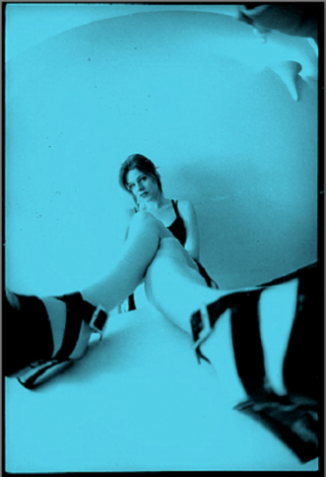
Penta Leslee Swanson in the kitchen. Paris 1996
“I should have been born in Seattle” Penta Leslee Swanson tells me. “Instead I was born in Wenatchee Washington on September 14, 1962, though I never lived there. My parents were visiting my grandmother in Moses Lake. At the time there was no hospital in Moses Lake so they had to drive almost 70 miles to Wenatchee. That was the closest hospital…That’s where I was born. The Deaconess Hospital in Wenatchee Washington
That first long trip was a prologue to the peripatetic life of the girl born Leslee Swanson. Although she went by the name Leslee growing up and in the early stages of career, let’s dispense with the earlier name and use ‘Penta’ just to keep things clear.
“I knew from the time I was a child that I was a singer. I just knew that’s what I wanted to do. I always knew that was what I wanted to do. I grew up in a household with a sister who was 11 years older and she was a big Beatles fan. So I grew up listening to popular music… especially the Beatles. It was just something that I loved all my life. My mom raised me and two of my brothers as a single parent. We grew up all over in Seattle. We moved all the time. We moved every six months to a year. It was nuts”.
“I started in my first band when I was 13” says Penta, who was still known as Leslee to her friends and family. “We did cover songs. I don’t even remember the name of the band, but I was hooked. That was it. I got asked to be in other bands over the next few years, and sang in a couple of them. One of the bands I played in was with Richard Stuverud. He played with The Fastbacks for awhile in the 1980s. When Richard was in my band we used to call him ‘Dickie’.
“When I was 15 I had a boyfriend named Jeff Gilbert. He was really cute back then, and quite a bit older than me. He and I wrote songs together and I did my first recording with him when I was just barely 16 at a studio on Queen Anne Hill called ‘Big and Famous Studio’ We recorded about 6 or 7 songs. I actually have cassette copies of the tapes. The songs were super-pop. I think Jeff was trying to go for a Beatle-esque kind of thing. even though he was a big Rolling Stones fan. It was really cute, really sweet music Jeff Humphrey from the Seattle band The Moving Parts drummed with us sometimes. John Nay who’d go on to play in The Lewd and The Frazz also recorded with us.
As improbable as it may seem the Jeff Gilbert that Penta mentions is the same Jeff Gilbert of Seattle heavy-metal fame. Jeff wrote about metal bands for The Rocket, Playboy, Spin, Britain’s Kerrang! and as a contributing editor for Guitar World. He was manager of Seattle’s Mansplat Record Store and managing editor of their magazine, Mansplat! He compiled a series of ‘fanboy’ movie reviews from Mansplat! Magazine called ‘Drinkin’ & Drive-in: Horror, Sci-Fi, Beer Vol. 1.’ According to Viral Recordings blog ‘...the reviews are offbeat, darkly humorous and wickedly insightful”.
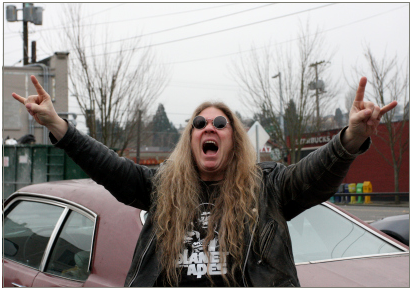
Jeff Gilbert outside The Feedback Lounge in West Seattle.
Jeff is also the author of ‘Trick or Shriek’ and ‘Camp Vampires’ two schlocky booksfull of horror movie clichés and teen-age terror…on purpose. In fact, Gilbert has plenty of serious journalism under his belt. He was a long-time disc jockey for Seattle’s KZOK radio and introduced his listeners to unknown metal bands that would go on to be stars. He also gave the local guys airplay. He was one of the co-owners of Seattle’s rock hangout/bar The Feedback Lounge. The bar lasted from 2009 to 2015 and was a “must visit” for music fans, and tourists taking in the Seattle music scene. Jeff might be best known for the ongoing appearance on the ‘Lame List’, self-deprecating sketches on Almost Live!,a local show that aired between 1984 and 1999 on Seattle’s KING TV.
Local comedian John Keister’s hosted the show from 1988 to 1999, which is the era the show is best known for. Almost Live! was later re-edited to remove ‘local place-names, and broadcast on Comedy Central. It should be noted that Almost Live! also launched the career of Bill Nye, the Science Guy.
In short, Jeff has more Heavy Metal cred than many of the musicians he writes about. He also has a wicked sense of humor. He once said;
“Grunge isn’t a music style. It’s complaining set to a drop D tuning”.
Back let’s return to Penta’s story;
“One day Jeff Humphrey, the drummer from The Moving Parts came in while we were recording and said ‘You guys should hear this single that just came out, because you guys sound a lot like this! It was The Pretenders‘ ‘Kid’. So of course I fell in love with The Pretenders right then and there.
“I was working at Tower Records by then” says Penta. (Jeff Gilbert had worked there previously). “I was the youngest employee there. They put me in the back room re-sealing records that customers had returned.That was my job because nobody else wanted to do it”. Bill Larsen, who worked with Penta explains that Tower Records used to say ‘if you don’t like it, just bring it back‘. When records got returned by customers we’d just send the returns down to the basement where there was a re-sealer. So the records got re-sealed and we put them back on the racks” he says while laughing”.
“Bill Rieflin was also working in the back room at the time” Penta tells me. “He was the shipping and receiving guy. That’s how I met him.. “Now he’s one of my best friends. He never talked about being in a band or anything. When I went to see Iggy Pop at the Showbox in Seattle, Bill’s band opened for Iggy…and there was Bill up on the drums. I thought ‘what are you doing up there?‘ (she laughs). I had no idea. The band turned out to be The Blackouts. It was their first show”.
“So that’s how I got started” says Penta”.
While she was still in high school she started going to more shows. Penta says she learned a lot more about music by expanding her experience of new music. She also admits getting into bars and other places that she wasn’t supposed to get into because she was underage. Later Penta moved into a house with some of The Blackouts and others who were or had been Seattle’s earliest practitioners of new, alternative and highly original music. It was during the time she lived with them that she started The Dynette Set.
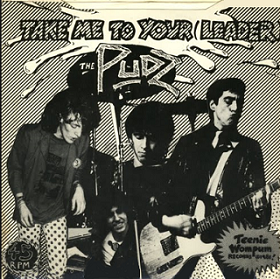
TAKE ME TO YOUR LEADER The Pudz.
Rob Morgan, Mark Halterlein,
Dave Drewry, Dave Locksley
“Around this time I saw Rob Morgan’s group The Pudz” Penta says. “I just flipped. I just loved The Pudz. Then I thought ‘this would be so great, but with chicks” she says with a laugh. “So that’s how I got the idea for The Dynette Set. I thought ‘there’s this whole genre of music; this ‘girl group’ thing that nobody ever thinks about’. So I just put my ideas together and started talking to different people”.
There was lots to love about Rob Morgan and The Pudz as well as his later band, the long-running (now re-united) band The Squirrels. Over the years Rob has been backed by some of Seattle’s best musicians while he weaves in and out of pop songs and mashes them up at a dizzying speed. It’s both comic and jaw-dropping in it’s expansive brilliance. Morgan careens onstage, makes his way into the audience, sometimes leading conga lines out the door, then back to the stage…all the while singing.
“One day at Tower Records Penta was re-sealing records” Bill Larsen tells me. “We started talking and asking ‘What kind of music are you into?‘ She said, ‘Well I’m really into the Beatles and Ronnie Spector,The Ronettes, and Darlene Love’ and I said, ‘Shit! this is what I’m into’. Then she says ‘I want to start a band‘ and I told her ‘well count me in’. It was kind of funny because I’d just met Dave Drewry a couple of weeks before that. She told me “I have a drummer named Dave Drewry, so I told her ‘Yeah, I know Dave. I just met him. He’s a great guy!’”
“Dave Drewry was the first person I talked to about it” according to Penta. “I said ‘I really want to put this band together and do something like you’re doing in The Pudz, but with women, doing ‘girl group’ stuff’. He loved that kind of music and he said ‘yeah, yeah, sure‘ just brushing me off. Finally I made a demo tape at a studio that was then in Pioneer Square. I sang vocals over the top of Ronnie Spector and all those people. I played it over the phone for Dave. He got excited and he said ‘Oh wow! These sound really great with you singing’. Dave said ‘You should talk to this person and to that person’ so I approached Bill Larsen, a guitarist that played in The Loud Ties. Then I talked to Riki Mafune. She was also someone that Dave recommended. I called her and immediately fell in love with her.
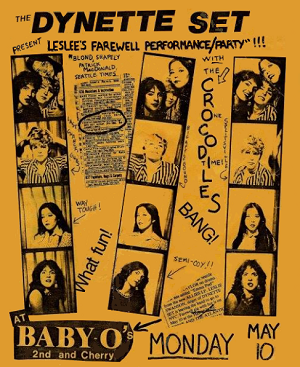 Riki Mafune remembers meeting Leslee the first time. Riki now refers the young woman she met as Penta. the She says “I knew a lot of the people…Bill Larsen and Penta worked together at Tower Records at the Mercer Avenue store. Before that Penta had worked at Budget Tapes and Records on ‘The Ave’ (the nickname for University Way near The University of Washington). I knew Bill and I knew Brent Pennington because Brent and I were dating. At the time Brent was in one of Seattle’s early punk-power pop bands The Girls. I was hanging out on The Ave a lot. Bill and Brent already knew each other. Bill, Brent and Dave were walking musical encyclopaedias.. They had this musical bromance going on, which was cool. That’s how I met Penta. Bill Larsen had heard Penta sing, but he hadn’t heard me. Rumor got around that I was a singer, songwriter and guitar player. Penta and I met at the frickin’ Frankfurter hot dog stand on University Way of all places. We talked over Penta’s concept. I knew The Girls were kind of on their last legs for a lot of different reasons. Brent was looking for a gig and Dave was playing with just about every band in town. He was heavily invested in Jim Basnights band The Moberlys and The Pudz. I’d known Rob Morgan of The Pudz forever!!!. I’ve known him longer than I’ve known Penta.
Riki Mafune remembers meeting Leslee the first time. Riki now refers the young woman she met as Penta. the She says “I knew a lot of the people…Bill Larsen and Penta worked together at Tower Records at the Mercer Avenue store. Before that Penta had worked at Budget Tapes and Records on ‘The Ave’ (the nickname for University Way near The University of Washington). I knew Bill and I knew Brent Pennington because Brent and I were dating. At the time Brent was in one of Seattle’s early punk-power pop bands The Girls. I was hanging out on The Ave a lot. Bill and Brent already knew each other. Bill, Brent and Dave were walking musical encyclopaedias.. They had this musical bromance going on, which was cool. That’s how I met Penta. Bill Larsen had heard Penta sing, but he hadn’t heard me. Rumor got around that I was a singer, songwriter and guitar player. Penta and I met at the frickin’ Frankfurter hot dog stand on University Way of all places. We talked over Penta’s concept. I knew The Girls were kind of on their last legs for a lot of different reasons. Brent was looking for a gig and Dave was playing with just about every band in town. He was heavily invested in Jim Basnights band The Moberlys and The Pudz. I’d known Rob Morgan of The Pudz forever!!!. I’ve known him longer than I’ve known Penta.
“Penta and I said ‘let’s put our heads together’. Dave Drewry was in. Brent was in. So Dave and I went to talk to Penta, Dave wanted to find a little bit more about what we wanted, so, Penta and I started talking about songs and looking into how to fill out the band, because we wanted that ‘girl group‘ format”.
It was 1980. Scott McCaughey was working at Cellophane Square Records in the University District. His girlfriend was Christy Wilson (later known as Christy McWilson after Scott and Christy married) They had recently moved to Seattle from San Francisco. Christy was working at The Deluxe Bar and Grill on Capitol Hill Broadway Avenue. Dave Drewry suggested her to Penta and Riki. Dave only knew she was Scott’s girlfriend and that she sang.
“It all came together organically”. Says Riki.“Bill Larsen was already on board because he was totally into that genre and Dave Drewry was there.. Of course Penta and I were committed.
“Riki had done some songwriting”. Says Penta. “She was even younger than I was. After we met she said, ‘well I have this boyfriend and he’s played in a band’. It turned out to be Brent Pennington, who had been in The Girls, so he ended up being the guitar player. We did a whole lot of auditions for another vocalist, but nothing worked. People couldn’t sing; they thought they could, but they couldn’t. It was then that Dave said ‘there’s this woman that just moved here from San Francisco with her boyfriend. You should see about her. I heard that she sings’. Then we found out she was the same woman who was with Scott McCaughey. Riki and I went over to her house to see her audition.
“Scott and Christy were living right off the freeway just south of 45th street. We were sitting there on their porch waiting for her”recalls Riki.. “I was the baby at 17 at the time all this was going down. Penta was a little bit older than me. Christy said that when she walked up and saw us sitting on her porch she thought….well she later referred to us in a letter as ‘teen queens’. She thought we were chewing bubble gum, but I corrected her recently and said ‘No! We were eating Starbursts!‘ There I was on her porch with my candy and my Marlboro Lights”
The three of them went inside and Christy put on a Connie Francis record and sang into an empty wine bottle, and danced around the room singing.
“We were like ‘who cares if she can sing? she’s hilarious!’. Penta says. “We thought she was great. Then she said ‘I have this boyfriend, and he plays the bass, if you need a bass player’. Of course that was Scott McCaughey. So that’s how The Dynette Set got put together. That was a really wonderful experience”
Their first gig was at The UCT Hall (United Commercial Travellers Hall) on lower Queen Anne Hill. It was Penta’s birthday, but she was still going by Lesslee back then” says Riki Mafune. “We literally took off from there. It was like a rocket! We opened for The Fastbacks. Duff McKagan was drumming for them. We were nobody. It was our first gig. It was a pretty good show, even though the crowd leaned a little more to the punk side than the pop side. But everybody seemed to dig us”.
It was probably this show and the nexus that would develop with Kurt Bloch and Scott McCaughey that led to The Dynette Set’s Christy McWilson, Riki Mafune and Leslee Swanson to provide back-up on two of The Fastback’s earliest recordings, ‘In America’ and ‘Whenever I’m Walking.
“I lived at Chez Macabre during this period” Penta says. Chez Macabre was a communal house that saw many of the early Seattle alternative scene had paraded through…too many to name here.
“Mike Davidson had just moved out and I took his room. Roland Barker and Giselle Spence across the hall from me. Neil Hubbard and Mary Moyer were living in the basement. Homer Spence was living on the main floor. Mike Davidson and Roland Barker were in The Blackouts at the time. Roland became part of the band Ministry along with former members Bill Rieflin and Paul Barker. Neil went on to release the seminal album “The Seattle Syndrome” Volumes One and Two. He also released the first Blackouts album Men in Motion on his Engram label. Giselle Spence would move to Hollywood and become a seamstress and costume designer for the film industry. Homer Spence was a former teacher who gave it up to become a member of the Telepaths and later a sort-of philosopher who drove cab and became one of Seattle’s most loved and respected bartender. He was also a baseball fanatic who brought his television into the bar to watch every World Series.
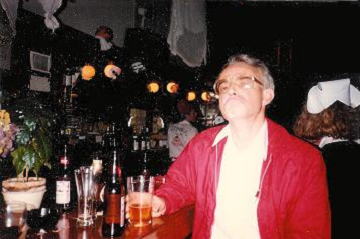
Homer Spence. After work at The Virginia Inn.
According to Jeff Stevens of the City of Anxiety blog;
“Homer Spence deserves more than mere passing mention here, since he remains today a genuine legend within Seattle’s countercultural community. A native son of Tulsa, Oklahoma, Spence came to Seattle to teach (economics) at the University of Washington, but quit that gig to play music instead. He would then also work various common jobs to support himself, including cab driving and bartending at Belltown’s Virginia Inn. Spence died tragically of a heart attack on January 18, 1991. Homer is sorely missed to this day.
Kurt Werner had been a member of Seattle’s now-legendary band The Telepaths. His brother Erich Werner was a founding member of The Blackouts. Three of The Blackouts members, Bill Rieflin, Roland Barker and Paul Barker would later join Al Jourgensen to transform his synth-pop band Ministry, who had toured with new wave acts like The Police Culture Club, A Flock of Seagulls, Depeche Mode and Culture Club. The four of them, with a bit of outside help from Adrian Sherwood and Keith LeBlanc turned Jourgensen’s original new wave band into a caustic, severe,speed-dirge powerhouse. Ministry went on to be one of the most popular of the so-called industrial bands of the ‘80s and 90s. Roland Barker was part of Ministry in 1986, but returned to the band in 1992 and 1993. Rieflin left the band in 1994… midway during the recording of Filth Pig. Paul “Ion” Barker (a.k.a. Hermes Pan) remained in Ministry 27 years, when he finally broke ties with Al Jourgensen. It’s said that neither will talk to the other since the band’s break-up.
Penta tells me about first meeting Paul “Ion”Barker, “I met Ion who was playing with The Blackouts the first show after bassist Mike Davidson had left the band in 1981. His brother, Roland Barker was already a member of the band.
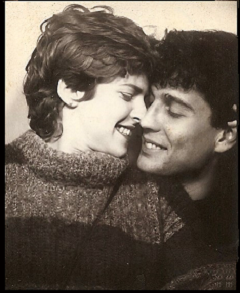
Penta and Paul Barker
Seattle 1981
“Ion was an important influence in my life. A true artist. I had never been with anyone who had lived in Europe before.” He was so sophisticated to me, highly intelligent.” Penta tells me. “He was real intellectual – the first I had ever met; not to mention him being extraordinarily beautiful and a brilliant musician. We spoke,” says Penta,” and I told him he was a perfect addition to the band.”
That was all it took. I didn’t see him for the rest of the summer, but in September I went to Gigi’s Spence’s birthday party. Homer Spence was my date. I saw Ion there. We began to talk to one another. “He asked me if I wanted to take a walk and I agreed. Then he asked me if I would go home with him. I didn’t say good-bye to Homer…later I apologized to Homer for leaving him at the party but he understood when he saw Ion and I had fallen for each other. Ion lived in a loft Belltown just above the Blackouts’ rehearsal space.. I believe that was a space rented to him by Danny Eskenazi (of the vintage store Dreamland). I had never been in a loft space before and I was struck by Ion’s style and the way he furnished his space. He told me he was a minimalist. He had purchased Homer’s vintage 1960s Dodge Dart with the push button controls on the dash. I was very smitten and impressed by him. Ion had just returned from living in Germany for several years and spoke fluent German”.
“Ion used to buy me clothes and things that HE liked to see me in.” Penta tells me. “He influenced my style a great deal. I would say that being with him is what inspired me to move to NYC and pursue a more artistic path than the one I was on in Seattle. I had been in The Dynette Set when we were together and he came to most of our shows. He was so unique looking that he really stood out in the crowd..” “After The Dynette Set shows were finished we would head over to a Blackouts show together. They usually played very late. It was a crazy combination. The Blackouts were always my favorite local band; all of them were extraordinary people.
I stayed with Ion until I moved to New York City. Shortly after I left, Ion moved to Somerville, Massachusetts with the Blackouts. I saw him in New York City several times after that . After he joined the band Ministry I got invited to their shows whenever they played in a city I was living in. We’re still in touch to this day. What a lovely man he is.”
“I stayed with The Dynette Set less than a year” Penta says. “I left Seattle in late 1982. I wanted to go to the big city and be in the arts community. I chose New York and just decided to go”. When I first got to New York I was just getting oriented, and getting over my culture shock.
According to Riki Mafune;
“After Penta left The Dynette Set, all we knew was that we were being offered gigs, so we did some auditions for a new singer which was really hard because the original line-up, as I said before, happened organically. We had all just really jibed. So in finding a third voice, a third front person we just lucked-out. We found Shelley Stockstill and she just stepped right in. She was there for the main run of The Dynette Set. She was such a workhorse…we all were, but she was totally invested, never missed a gig. We were really lucky to find her because if we hadn’t found her I’m not real sure we would have continued”.
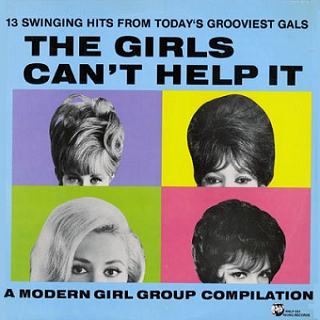 The change from Penta to Shelley seems to have gone unnoticed by some. Shelley and Penta had similar looks and the same colored hair. “Well.she is taller than me and she’s younger..by nine years” Shelley says. “One night out when we were out in Belltown we found out we were both born in the same hospital; The Deaconess in Wenatchee. They only had one birthing room!”
The change from Penta to Shelley seems to have gone unnoticed by some. Shelley and Penta had similar looks and the same colored hair. “Well.she is taller than me and she’s younger..by nine years” Shelley says. “One night out when we were out in Belltown we found out we were both born in the same hospital; The Deaconess in Wenatchee. They only had one birthing room!”
Sometime in the early 1980s Penta recorded a version of a song written by Jackie DeShannon called Each Time. It had been a 1965 hit for The Searchers. Penta’s recording includes Phil Motlet on bass, Dave Drewry on drums, Robert T. Dale on guitar, Bill Larsen on guitar and percussion and Leslee Swanson on vocals. Engineer and co-producer with Steve Larsen was Terry Date.
“That was kind of cool. We recorded it in a day”says Penta.”But it deserved more time. We recorded it at Steve Lawson’s studio with Terry Date. Terry was the in-house producer at Lawson’s studio at the time. He went on to become a big local metal producer. Metal wasn’t really his thing but he knew how to get the sound. He was a really nice guy to us. Considering the time we had to do it in I thought he did a pretty good job. We sent the demo to Gary Stewart at Rhino Records and he said ‘Yeah we’re gonna get it done. We’re gonna put this track on one of our records’, so we said ‘OK! Great!!!”
The song Each Time appeared on the Rhino Records compilation The Girls Can’t Help It released in 1984. The date of the recording is unclear but it’s clearly after Penta left The Dynette Set. There is also have a track on The Girls Can’t Help It by The Dynette Set. The song is Seed of Love was written by Penta’s replacement Shelley Stockstill. The band is the rest of the classic Dynette Set line up. The track was produced by Jim Wolfe. Both songs are as much fun as you’d expect coming from the young Leslee Swanson and from The Dynette Set. Although the album was deleted from the Rhino catalogue years ago, it’s still fairly easy to find through collectors on vinyl.
Penta continues her story by explaining how her name came about.
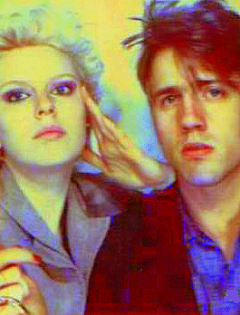
Penta and Eliot Crimson
“I was born Leslee Swanson, but now I go by Penta Leslee Swanson. Penta was just a word that came to me that I really liked. When I went to New York City, Kurt Werner came to pick me up at the airport. I knew who he was, but I had never met him before. I was going to stay at Jim Basnight’s place and Kurt was already living there. At least I thought his name was “Kurt” so that’s what I called him. The first time I did he said ‘my name is Eliot Crimson!’ I said ‘OH! excuse me’ I thought to myself ‘well, where did that come from?’. Then he told me a little about the back-story which I don’t remember. I do remember him telling me how he re-named all of his friends in a book he’d written. He changed the names of his friends into all these crazy names”
“I told him if I was ever going to change my name it would be to Penta. He said ‘PENTA??? Oh my god that’s Fantastic!’ He flipped over it. Jim Basnight was in Seattle at the time so Eliot took me out to see New York that night. We hit it off right away. I was crazy about him and vice-versa. Everywhere we went that night he introduced me as Penta and I really liked it. So I just kept the name and I’ve used it ever since. I was 19 at the time. Later I figured out things about the name. In Greek it means five and I’m the fifth of five children and five is my birth path number in numerology. When you add up all the numbers of my birthdate it becomes a five. My mother was an astrologer. She was quite a remarkable woman. I grew up surrounded by psychics and numerologists and astrologers and palm readers and all that.
In 1983 Eliot and Penta moved back to Seattle and spent a year living on Capitol Hill. “I wasn’t doing anything except being Eliot’s girlfriend” Penta says. I was just dealing with Eliot because he was a handful! We’d sit around and play music together but we never did any shows. I did work with The Moving Parts for a bit. Damon Titus and I got together and started talking about possibilities, but we didn’t do anything.
“I went back to New York City in 1984, and right away I got involved in a cabaret group called Mader and his Biarritz Orchestra” Penta recalls. Mader (born in 1958 as Thierry Schollhammer in Saint-Paul-de-Vence, France) was the leader of a 13 piece band. “He played guitar and accordion and sang” says Penta. “I also sang and we had three violins, contrabass, woodwinds and horns, a flute and a clarinet …it was a wonderful band. It was really my dream. We were doing stuff from Brecht/Weill, and Edith Piaf, so I was singing in French and German, and of course some English. That was a really great experience. I’d been learning Piaf songs on my own for years. I just loved her work. I wasn’t taught French. I just sang it phonetically. Now I speak fluent French because I lived in France so long but I didn’t know any of it back then.
In the early 1980s Mader was playing clubs around New York City that included trendy hotspots like Danceteria, The Limelight and The Pyramid Club. In 1984 he released a solo album based on his cabaret performances called Tangobidet. It was voted best album of 1984 by the then-influential Details magazine. According Mader’s official biography ‘He became an overnight cult sensation. Somewhere between Yves Montand and Lou Reed, well out of the pop mainstream. Mader’s bold performances of Tangobidet in New York City’s main clubs fascinated audiences because of it’s timeless originality in stark contrast to the New Wave trends of the time’.”
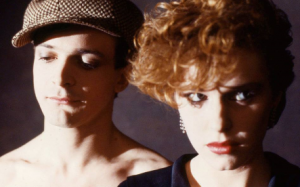
Mader and Penta New York City’s cutest couple ,1984
At that time Details magazine also called Mader and Penta ‘New York’s cutest couple’.
After success in New York, Mader and Penta moved to Strasbourg, France. Mader had gotten a job offer to be be a producer at a recording studio there. “It turned out to be a total disaster” says Penta. “We hated Strasbourg. We only stayed there two months. Then we went down to his parent’s place in Marseilles and then to Paris. In fact we were travelling between Marseilles and Paris the entire time we were in Marseilles. That’s when I met Hector Zazou in Paris.
Zazou is a legendary figure in contemporary French music. He is adored in France and internationally recognized for his work that combined the work of popular western musicians with folk musicians from Africa, Asia and Europe. He was a skilled musician and avant-gardiste with a cult following around the world. Zazou was born Pierre Job on July 11,1948 in the town of Sidi Bel Abbès in Algeria while it was still a French colony. His father was French and his mother Spanish. After the Algerian war of independence his family was part of the 900,000 Pieds-noir (Algerian-born Europeans) that fled to France in 1962. Many of the Pieds-noir settled in and around Marseille. The French government was not prepared for the chaos such a large number of refugees that were a sudden influx to France.
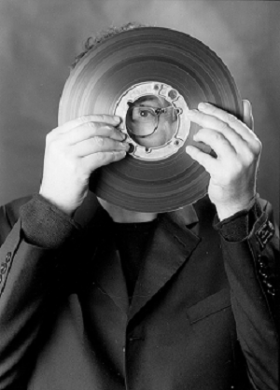
Hector Zazou
There are many theories how the term Pieds-noir came about. The term literally means ‘Black Feet’ According to Le Dictionnaire Robert one possible establishment of the term Pieds-noir dates back 1901 to describe sailors working barefoot in the coal rooms of ships. These sailors’ feet would be dirtied by the soot and dust of the coal they used to power the vessel.. Around the Mediterranean this often referred to Algerians working on ships. It was a pejorative label for Algerians until around the middle of the 20th century, when it began refer to the French born in Algeria. It slowly went from a racial epithet (used against native-African Algerians) to become synonymous for the French people who had colonized Algeria.
In the mid 1960s, after Pierre Job’s family having been evacuated from Algeria, Pierre re-named himself to Hector Zazou and founded an artists’ commune that occupied a ruined castle near Marseille. He had chosen the name Zazou’ to refer to a non-conformist youth movement during the Nazi occupation of France. The Zazou’s were similar to the Zoot Suit culture of the United States, but they had a political bent, and were defiant (as much as they could be) toward their German occupiers. It was a way for the former Pierre Job to show his defiance to the norms of music and culture.
Mader had been part of Zazou’s commune in the 1970s before striking out on his own, but he and Zazou had remained friends since then.
“Zazou heard me sing, and he loved my voice” says Penta. “Right away asked me if I would sing in his band. I said ‘Yes! of course!’ and I ended up doing a little tour with them in Europe during 1986. The band was fronted by the well-known Congolese singer Bony Bikaye.
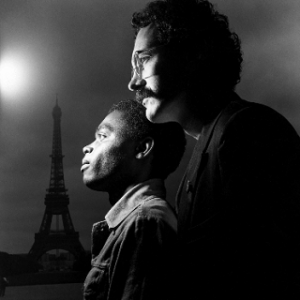
Bony Bikaye and Hector Zazou
Bikaye was not what one would think of as a typical, traditional African artist. His musical interests included Krautrock and Karlheinz Stockhausen. He was also an early advocate of using synth-loops, sequencing. the latest electronic studio techmiques and wild avant-garde musical themes.
Later Pitchfork magazine said of his collaboration with Hector Zazou on the 1983 album ‘Noir et Blanc’ (Black and White) ‘The electronic musicians Guillaume Loizillon and Claude Micheli (collectively known as the duo CY1), laid down knotty sequences and gurgling metallic textures while Bikaye multi-tracked his voice in warm, woozy layers…They sound wonderfully alien: weird, vine-like tangles of arpeggiated synthesizer and sweetly harmonized vocals, robotic and ghostly all at once’.”
During the European Hector Zazou/Bony Bikaye tour that included Penta, Bikaye left most of the studio effects and electronica behind in favor of a more Afrocentric approach to music. Instead of the “weird, vine like tangles” he favored African Pop infused with European overtones.
“There were two African backup singers touring with Bikaye who had really great voices” Penta says. “We sang in Congolese dialects, Lingala, Kikongo, Swahili and in French. I had no idea what the hell I was singing. It turns out it was very heavy political stuff. It was really great and a really fantastic experience”.
Meanwhile Mader had returned to the United States where he began building a career as a respected soundtrack composer for film and television. He combined his fascination with the music of Ennio Morricone, Henry Mancini, Nino Rota, Maurice Ravel and French popular music of the 1920s that he’d heard as a child from his grandparents collection of of old 78rpm records. He infused these influences with his own unique musical sensibilities. It wasn’t long before he started scoring for important indie films by respected directors. Starting with Ang Lee’s films ‘The Wedding Banquet’ and ‘Eat Drink, Man Woman’. He went on to score Robert Greenwald’s ‘Steal This Movie’ (based on the life of Abbie Hoffman), Duane Baughman and Johnny O’Hara’s documentary Bhutto, about the life and assassination of the late Pakistani leader Benazir Bhutto, Alexandre Rockwell’s In The Soup, and Lisa Sprecher’s Clockwatchers among scores of other television and film projects. He even found time to record and release a second solo album 5 Legged Fish in 2013.
Back in France Penta, as well as other Seattle-based musicians Bill Rieflin and Fred Chalenor continued to work with Hector Zazou. Bieflin and Chalenor worked with Robert Fripp, Matt Chamberlain, Hector Zazou and Pete Buck as part of the Slow Music Project in 2005 and 2006. Sadly, Chalenor passed away June 23, 2018 of early onset Alzheimer’s Disease. Chalenor had collaborated with Wayne Horowitz and ex-Soft Machine bassist Hugh Hopper as well as being a member of the band known best known by Seattleites, 3 Swimmers
Shortly after her tour with Zazou and Bikaye Penta returned to New York City where she met her first husband Carlo Altomare.
“I met Carlo through a friend of mine that I was living with on Manhattan’s Lower East Side” Penta recalls. “Her name was Karey Degnan but she used to call herself Cruella De Ville. She had her hair like that and it was awesome”.
Cruella DeVille was well- known throughout the Lower East Side for years.
“We were high on mushrooms and we were crossing the street at Avenue A and 8th Street” Penta tells me. “Carlo was walking in the opposite direction and we met in the middle of the street. Later he came over to Karey’s and when I moved he kept following me wherever I went. So we got together pretty quickly”.
“We lived at the Alchemical Theater space. We were squatting at the Alchemical Theater space for three years. We built the theater at this squat and it was really fantastic. It was harsh, but it was awesome. Later we lived at The Living Theater’ Penta says laughingly. ‘We even lived with Gordon Raphael and Josie Lazo for awhile!”.
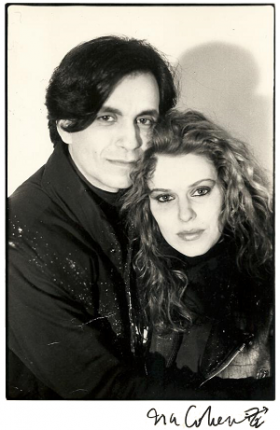
Penta and Carlo Altomare Photo: Ira Cohen
“Carlo had been the musical director and the one who did the music for The Living Theater. “He and I also worked with Tim Wright of Pere Ubu. We had a trio at the time and collaborated together for the live for the music accompanying for The Living Theatre’s production of ‘The Tablets” Penta says.’The Tablets is amazing. It was such a new thing at the time…that would have been around 1986. Anyway, Tim Wright played the bass, I played all kinds of crazy percussive instruments and did my magic with sounds and voices. Carlo played piano which is his specialty. Carlo is amazing. He composed the music for The Living Theater for many years. He’s also a modern classical composer and pianist”
“The guy who wrote The Tablets is Armand Schwerner” Penta tells me. “He was the cousin of Michael r.”
Michael Schwerner, along with Andrew Goodman and James Cheney were abducted and murdered by the Ku Klux Klan in June of 1964. The three of them were involved in the civil rights ‘Freedom Summer’ and on their way to an event in Meridian MS. They were pulled over for speeding outside Philadelphia Mississippi. The three were taken to the local jail, where they spent several hours. After being released the trio were followed by the police and a group of angry racists and Klansmen. The three were stopped again, but this time they were taken to a remote location and murdered. Schwerner and Goodman were shot in the heart and Cheney ( black man) was severely beaten and castrated before being killed by three shots. Their bodies were then shoved back into the Ford Station Wagon they had been driving and taken by the mob where they buried the men within an earthen dam that was then under construction. The car was later located in another location where it had been set ablaze. The whole affair and original acquittal of many who took place was one of the most profound incentives for all Americans to come to believe Equal Rights were also the natural rights of minorities.
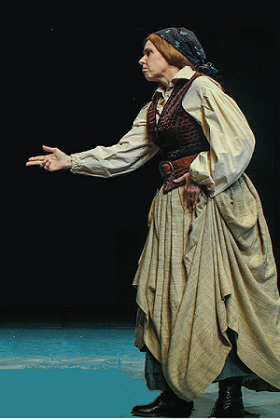
Penta as Mother Courage
Mother Courage and Her Children
U of O Robinson Theater March. 2018
The Living Theater is still going, even though Judith Malina who co-founded The Living Theater passed away in April of 2015.
Malina and her husband Julian Beck had started the theater company in 1947. The first piece they did was written by Pablo Picasso. They were a radical political theatre troupe that rose to prominence in New York City and Paris during the 1950s and 60s. The Living Theatre was originally established as an alternative to New York’s commercial theater and pioneered the unconventional staging of poetic drama. They produced plays by William Carlos Williams, Gertrude Stein, John Ashbery, Paul Goodman and Kenneth Rexroth among others. They also presented plays by Europeans whose works were rarely seen in the United States. These included Jean Cocteau, Bertolt Brecht, Luigi Pirandello and Federico García Lorca. Julian Beck died in 1985, leaving his wife to capably run the theater for the next 30 years. In1983 The Living Theatre and its founders were the subject of the 1983 documentary Signals Through The Flames.
The Alchemical Theater has also come into prominence. Aside from their own company they offer space at the re-named Alchemical Studio for several other theater companies to rehearse and perform. Besides being it’s founder, Carlo Altomare, Penta’s former husband, is now it’s Artistic Director
.I was doing theater for quite awhile in the late 80s, but then I started writing songs” Penta says. “Jeff Cerar had moved to New York City and I played with him for awhile. We did my songs and he accompanied me on guitar. We’d do bar gigs around the East Village. That was really fun. It was kind of a weird fluke that we happened to find out we were both in New York at the same time.I don’t remember how that came about. Somebody must have told me. After a short period performing with Jeff Cerar, Penta set her sights on the theater again.
“I did a show in New York City with Sharon Gannon, David Life and Kathleen Hunt at The Limbo Lounge in the East Village” Penta says. “I was working with Sharon at the time at David Life’s Life Café. “I performed in the nude and sang accapella..just making noises and sounds and sang doing all sorts of crazy stuff with my voice. It was really wild. Sharon and Kathleen danced. I had painted all my body white and did accents on my breasts and accents on my pubic area. It was funny because Eliot had come to see that show and he brought Larry Reid and John Bigley with him.The U-Men were in town playing. They opened for Nick Cave at Danceteria.
Penta then began a collaboration with Tuxedomoon bassist Peter Principle (born Peter Dachert, in 1954 in Queens, New York).
“Peter produced a bunch of demos for me when I was in New York, right before Carlo and I moved to Prague. He was an amazing guy and a great musician. I had a bunch of songs and went to his place. He had a recording set up; a reel to reel, so we recorded six of my songs. I played accoustic guitar and sang. Peter played all the other instruments”.
Unfortunately Peter died July 17, 2017. His friend and bandmate Blaine Reininger, posted a message on facebook that said Peter ;was found in his room at Les Ateliers Claus in Brussels, where Tuxedomoon has been preparing a new tour and new music. He was the apparent victim of a heart attack or stroke’.
In 1990 Penta made another trip to Seattle. Carlo followed her and in that year, where their daughter Casimira was born. Soon Penta was back to work, While Carlo played briefly with the band Sky Cries Mary, alongside Ivan Král . Penta says she remembers Ivan used to call Carlo ‘New York; He’d call out to Carlo by saying ‘Hey!.New York!”
“In 1991 when I was in Seattle, I went into the studio with Bill Reiflin, Mike Davidson and Ivan Král. We did three of my songs and a couple of Ivan’s songs. I remember one of his songs was called ‘Cry For More’ (the song Bill Rieflin mentions) and Ivan had me sing lead vocals on it. Ironically I saw Ivan Král again in Prague because after they’d opened the borders he went back there to play music. A good friend of mine in Prague played with him, so I saw Ivan again”.
“We did a live gig together in Seattle” continues Penta. “Ivan Král played guitar. I don’t remember who played drums. Mike Davidson played bass. Bill Rieflin was kind of upset when I told him we did the gig. He asked ‘Why didn’t you ask me to play drums?’ I said ‘I’m sorry. I didn’t think you’d want to’. It was for the ‘Alternative to Loud Boats’ event that is held every summer when the Hydroplane races take place in Seattle. It was held over by Seattle Central Community College on Capitol Hill. I did that show a couple of times; once with Jesse Bernstein. That was really fun. Another year we held it down by the railroad tracks somewhere, and the trains kept passing by (laughs) It was terrible.
In 1992 Penta and Carlo and moved to Prague. Carlo had been offered a job as a Theater Professor at The University of Prague. Penta convinced Mike Davidson to move there with then. Mike was a ‘super-good friend’ according to Penta. He lived with Penta and Carlo when they moved there. He and Penta did a lot of shows together in Prague…just the two of them on their own.
“Oh my god, it was totally wild in Prague!!” Penta tells me while laughing. It was right after The Velvet Revolution that freed the country from Communist rule. “Some people told me it was like Amsterdam in 1968. We rented a place that cost us about $42 a month. Prague is a great city, but I was really glad to get out too. While I was living there I was going to Paris and working with Hector Zazou on a regular basis. I ended up doing an album that he produced in Paris while I was travelling back and forth from Prague. It was about half my own songs and half covers. His treatment of the music was really interesting. The album was called ‘Sorrow and Solitude‘. Zazou did a really fantastic job on it, but it really wasn’t me” Penta says. “It was very different than what I probably would have done myself, but it’s a beautiful record. Zazou had his own studio in Paris during the early 1992, but it wasn’t released until 1993 on the German label, Erdenklang.
Penta may be understating what she and Zazou came up with in recording ‘Sorrow and Solitude’
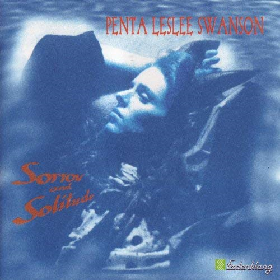 Ira Cohen (February 3, 1935 – April 25, 2011) was an American poet, publisher, photographer and filmmaker. He spent the 1960s living between in Morocco and in New York City. Penta met Ira through her husband,Carlo Altomare in New York City during the mid 80s. Later Penta introduced Ira Cohen to Zazou. She also introduced Bill Rieflin to Zazou. Ira took the cover photo for ‘Sorrow and Solitude’ and wrote some of the notes for the album. including;
Ira Cohen (February 3, 1935 – April 25, 2011) was an American poet, publisher, photographer and filmmaker. He spent the 1960s living between in Morocco and in New York City. Penta met Ira through her husband,Carlo Altomare in New York City during the mid 80s. Later Penta introduced Ira Cohen to Zazou. She also introduced Bill Rieflin to Zazou. Ira took the cover photo for ‘Sorrow and Solitude’ and wrote some of the notes for the album. including;
“Imagine whatever you will, but know that it is not imagination but experience which makes poetry, and that behind every image, behind every word there is something I am trying to tell you, something that really happened.” -Ira Cohen”.
“Ira wasn’t a musician” says Penta but I used his poem Annapurna Moon for my song on Return to Alpha.
“On Sorrow and Solitude, Penta Leslee Swanson bares her sole with her voice” reviewer Lynn Freedman wrote in 2006. “Picture a dimly lit alley way in Paris on a warm summer night. A haunting sax leads you into a small, unpretentious bar. Just you, the bartender and the jazz combo. On the stage a sultry singer is at the mike. She sings slowly and deeply, with eyes cast down.
Sorrow and Solitude is bluesy, moody, and unlike anything you’ve probably heard. Music for times of deep reflection, or deep relationships.”
I’m not sure if she’s being tongue-in-cheek or serious when Penta tells me “I missed the whole “grunge” thing that was happening in Seattle. but I do remember seeing Nirvana all over on European television.
“After we moved to Prague with our daughter we had a friend there named Vladimir Penta says. “One day Vladimir asked (here Penta goes into a fake Russian/Slavic voice). ‘Why are you naming your daughter Cazz-ee-meer-a?’ We said ‘Because it means ‘the bringer of peace’ which is what I thought. Vladimir said ‘no,no,no. Vlad-ee-meer is bringer of peace. Cazz-ee-meer-a is ‘BREAKER of peace. Penta says they all had a good laugh, since they’d chosen Casimira because to Carlo, as an Italian-American thought that it sounded more Italian than Slavik”.
“By that time I was really just doing my own stuff. I had a band in Paris simply called Penta at the time and I went through different band members over the next few years. Hector Zazou did a couple of shows playing in my band. I also did some recordings that were possibly going to be on one of his albums, Chansons des mers froides (Songs from the Cold Seas). He record three songs with me, but none of them came out on the album. I have the demos I did with him.
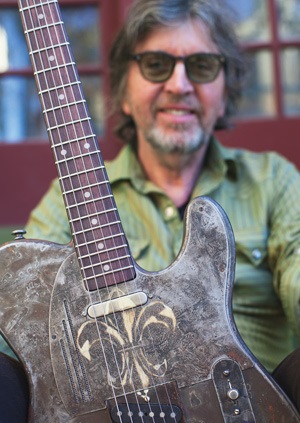
James Trussart with his Rust-O-Matic Fleur de Lys SteelCaster guitar. 2013
“In 1994 I split up with my first husband Carlo. I went to Berlin to think about the path I was going to take” Penta says. “I had a German boyfriend in Berlin named Tenta. Really. It was Penta and Tenta! No one believed it! Then I relocated to Paris full time. In 1994. I met James Trussart, who became my second husband. Our first date was on my 32nd birthday, September 14th 1994. James is a world-renowned guitar maker- a Luthier who has become much like the 1960’s British Luthier named Tony Zemaitis. James makes amazingly beautiful guitars. I think he’s the greatest guitar maker in the world. I’m slightly biased but I do think he’s the greatest. They sound fantastic!”
Zemaitis was born Antanas Kazimieras Žemaitis in London in 1935. His family was Lithuanian was of Lithuanian descent. He started making and selling his guitars in 1960, but in 1961, he came to the attention of many (mostly acoustic) stars of the day. After experimentation he began making innovative electric guitars started to be approached by famous players who wanted to use his guitars. In the 60’s and 70’s he was building custom guitars for the likes of Eric Clapton, Ronnie Wood (Then of The Faces), Keith Richards, and George Harrison. Zemaitis became even more famous after 1971, when asked a well-known gun engraver by the name of Danny O’Brien to do beautiful engravings on the metal-bodied guitars he was becoming known for. He was working for so many famous musicians that it’s said that George Harrison called him one day to ask about making him a new guitar. The phone was answered by Mrs. Zemaitis, who told Harrison, ‘Oh, no no no! He’s far to busy!’
Trussart followed in Zemaitis’s footstep, but taking it a few steps further. His metal bodied guitars are sometimes engraved, but he also creates designs that include unusual materials and oftentimes guitars that are rusted, or meant to rust over time. Above all, his guitars, like those of Zemaitis’s produced beautiful tones…after all, anyone can paint or jazz up a guitar, but it’s proof is in the quality of it’s sound. Penta calls James Trussart the greatest living guitar maker. This opinion is held by many many guitar players.
“James put a studio together in our house” Penta recalls. “It was a beautiful five storey house in Barbes-Rochechuart just off rue de la Goutte D’or. (Street of the Chest of Gold) near Montmartre. It was closed off to the public in a place called Villa Poissonnière (Villa Fishwife). We lived at nombre 3,Villa Poissonnière. We sent my daughter to l’École Foyatier, a school near the the foot of the funicular line that runs from the bottom of the La Butte Montmartre (The Montmartre Butte) near rue Foyatier to La Basilique du Sacré Cœur (The Basilica of The Sacred Heart, often shortened to Sacré Cœur-pronounced somewhat like sack-Ray Coor in English) at the top of Montmartre Mike Davidson had moved from Prague to Paris along with Penta. He worked, recorded, engineered and played in Penta and James’s home studio.
Bill Larsen and his wife visited Penta and James at Villa Poissonnière. He recalls;
“James Trussart is a good guy; a real interesting guy. We stayed at their place a couple of nights. James, of course, is a guitar builder…he builds incredible guitars. He also refurbished the house they lived in. It was like a row house; all brick and probably 150 or 200 years old. There was a facade and everybody had their separate key to their houses. James bought one of those places and totally gutted it. It was literally five storeys tall with a sub-basement. He totally gutted it to a shell, then rebuilt the whole thing. He’s really talented. He was buying a lot of the materials at flea markets (le marché aux puces) around Paris. He’d find an old pile full of interesting things. He put a spiral staircase in the center of the house toward the back. It was funny because one step was concrete and he said ‘I only had one mold that I bought at a flea market, so I had to mold one stair at a time’’. It was pretty cool”.
“It was like a fairy tale for me” says Penta. “I did a whole bunch of recordings over a period of seven years in the studio that we had built in the house.. It was a 16 track Fostex tape machine and a Mackie board. It was really ,but it sounded great. I had all kinds of incredible musicians passing through that were playing in Paris that I or play with. The results of seven years recording led to Penta’s unrecognized masterpiece, Return to Alpha.
“James and I used to get invited to all the shows, and get invited backstage, so I met all these incredible people over the years” Penta tells me. “I met David Bowie. I met Bryan Ferry. I met Marianne Faithfull. I met The Black Crows. I met Bob Dylan’s band-but not Bob. One of the guys in Paul McCartney’s band is a friend of mine. I’ve been backstage and meet all of those guys (except for Paul and Bob). ZZ Top. I met Elvis Costello (‘a real gentleman’ according to Penta), Nick Cave, James Burton and dozens of other well-known musicians. I also met Radiohead when they came through Paris. They played a TV show that James had all-access to. I got to watch them rehearse for the show! they were really people. Thom Yorke actually came up to me and introduced himself – very sweet”
Penta says she also met Elliot Murphy in Paris and became good friends. She calls him ‘a super-great guy’. Murphy came to prominence about the same time Bruce Springsteen was starting to get attention. Murphy’s debut album Aquashow got phenomenal reviews from rock music critics as well as reviews in Rolling Stone, The New Yorker and Newsweek. He too was set to be the “next big thing” but Elliot just didn’t get the fame and fortune that Springsteen got. Perhaps his songwriting was a bit too subtle, but he’s had a sizeable following over the decades, and was the subject of Jorge Arenillas documentary film The Second Act of Elliot Murphy. In 1990 Murphy moved to Europe and has based himself in Paris since then.
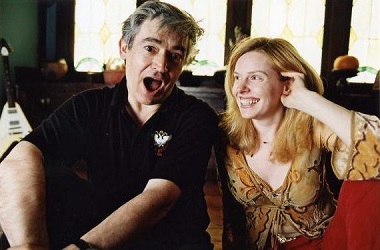
Chris Spedding and Penta
“I met Chris Spedding when he was doing the same TV show as I was” says Penta. “He was playing guitar with an early French Rock and roller named Dick Rivers ((born on April 24 1945 as Hervé Forneri). His name was pronounced Deek Rivers, after the character Deke Rivers that Elvis Presley had played in the 1957 film ‘Loving You’.The French Dick Rivers had been an early French Rock and roller who modeled his persona and singing career on Elvis. The French Dick Rivers had started as the lead singer of the band Les Chats Sauvages (The Wild Cats) and singing on his first record in 1961 on his fifteenth birthday. The band became such a sensation in France, they even caused riots at their shows. Rivers let the band in 1962, and set out on his very long, successful career over which he’s released 58 albums and 168 singles and EP’s
I think the show-but I’m not certain- was Poum Poum Tchak! (roughly translated as the sound of beating on a drum). I’d heard that Chris Spedding was there. Somebody said ‘yeah, you can go back and talk to him. He’s just in the back room over there’ I went in and he was sitting there by himself, kind of dozing off in his chair. I said ‘Hi!’ I didn’t say ‘I worship you‘, but I came close. I introduced myself and said ‘Would you play guitar with me?’ (Penta laughs). I just asked him if he would do it, and we became friends…and he did play on my album Return to Alpha! I also had some really great people on that recording. Alex Hacke of Einstürzende Neubauten played on the album. He was friends with some people that we knew in Paris. I think we must have gone to an Einstürzende Neubauten show and met him. Other players were Ira Cohen, Mike Davidson, Bill Rieflin, Warren Ellis, Marc Upson, Larry Mullins, James Trussart, as well as about another dozen musicians.
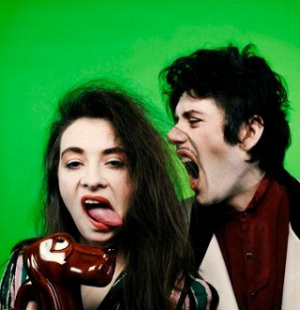
les Rita Mitsouko.
Catherine Ringer and Fred Chichin
James had made a couple of guitars for Fred Chichin of Les Ritas Mitsouko. Chichin’s wife and co-founder of the band was Catherine Ringer. In the 1980s and 90s they were pop superstars in France and had success worldwide. We went over to their house a few times and they came over to ours. They were very nice. Catherine was very funny. She told us that when she got bored with Fred she’d send him off to a brothel to get rid of him for awhile. They were awesome”
When Fred Chichin died of heart failure from cancer on November 28 2007 the whole of France was shocked and treated his death as seriously as the French have always done for artists like Edith Piaf, Collette or Maurice Ravel. Sadly, Chichin died two months after his first diagnosis of cancer.
Penta picks up by telling me “The group Pink Martini came for dinner one night. Another night all of Iggy Pop’s guys came over. Iggy’s drummer, Larry Mullins played drums on my CD. Larry is fantastic”.
Coincidently, Larry Mullins also played live behind the duo Such in New York City. One half of the duo was Seattle’s own Upchuck.
“Chuck was amazing” Penta remarks a bit sadly.
Another coincidence;
“Warren Ellis from The Bad Seeds and Dirty Three also played on Return To Alpha. He played violin on a cover of Jacques Brel’s ‘Ne Me Quitte Pas’. (Don’t Leave Me) We had just finished recording Warren’s part on violin and we went upstairs and his wife Delphine was there. She had also been in my band, Penta. They were both there and we turned the television on, and there was Jacques Brel singing ‘Ne Me Quitte Pas’. It was insane!”
“I have to say that Alex Hacke had a lot to do with the production of that album, as well as this other fellow, David Husser. He’s a French guy who helped me out a lot. Bill Rieflin contributed a lot to the song ‘Humans‘. I was visiting Seattle from Paris and I told Bill I wanted to do something with him. He said ‘OK, throw a couple of things at me and we’ll see what happens’ I just had the bass line and the lyrics and melody for the song. He did a whole entire production around it that was awesome. We ended up basically trying our best to copy what he did on Return to Alpha and we kept his rhythm tracks. David Husser did the guitars and Alexander Hacke played bass on that, but Bill had come up with the arrangement. I have a recording of Bill’s original somewhere…just me and Bill, which I’d really like to have now. Bill is amazing…just incredible. One of the nicest people. A really good guy too. Bill says:
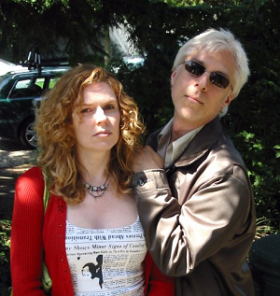
Penta with Bill Rieflin. Eugene Oregon, July 2013
“My memory is a little hazy, but I recall working with Penta on at least two occasions: one was on the song Humans from her record Return to Alpha; the other was a demo for Ivan Kraal on his song Cry For Love. The thing these sessions have in common was how effortless they were. In both cases, everything came together really quickly with no futzing about. Penta was very open and the overall flow of things was good. And, great results!! What more can you ask for?”
Return to Alpha was a big birthing process and it took seven years to make” Penta tells me. “Like I said it was all those musicians who came through the studio in Paris. Nobody got paid. It was all done through the kindness of their hearts. They were all incredible. Mike Davidson also played on Return to Alpha. Mike was a super-good friend of mine. He worked with me in our home studio. He did some engineering and played bass.
“Unfortunately we had a falling-out, but I really love him and I still really care about him” says Penta. “I would love to see him again. During a recent trip to Seattle I thought I was going to get to see him because I did some recording with Paul Hood of the Toiling Midgets. Paul asked me to sing some French for him on one song they were recording. Mike was supposed to be there and help us engineer it. We couldn’t figure out how to do it and were having a hell of a time. I ended up doing just the one song in French. Paul Hood is somebody I played with when I lived in Seattle briefly for a year. Paul’s a dear friend too”.
“Charlie Sexton is a friend of James’ and James has made guitars for Charlie over the years. One night he came to our house in Los Angeles to see James about a guitar, and as he was leaving James gave him a copy of Return to Alpha He told Charlie it was mine. The CD had just come out at that time (2002). So, later that night around midnight I get a phone call from Charlie Sexton! He says to me, ‘Who are you and where did you come from? I’m listening to your CD in the car and I’m on the fourth song and it just keeps getting better and better!’ That was an unreal moment for me! Bob Dylan’s guitar player was not supposed to be calling me and telling me how much he liked my music! Charlie still puts me on the list every time Dylan is playing somewhere near me. I’ve been backstage at Dylan shows so many times, but I have still never met him. I LOVE Bob Dylan; but I’ve had the privilege of watching Dylan and his band rehearsing!”
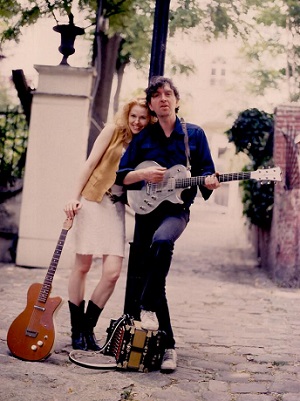
Penta and James Trussart, Paris
In fact the music on Return to Alpha defies genre. In fact it may be an entire genre of it’s own. One reviewer wrote ‘This music is incredible and her voice is mesmerizing. Return to Alpha can only be described as sultry and bohemian.
James Trussart who co-produced the album says “I think it was a great project. I think it’s fantastic too. Sometimes when people ask me what kind of music it is I like I try to explain depending who’s asking me. What’s great about Penta is she’s very cultured. She’s a really fantastic singer. I think she’s also a great songwriter. I’m still happy that we made something like Return to Alpha together. It was a great experience. It was a challenging experience for me, but I like that. It was also a chance to share the project with great people”
“The album was recorded in Paris” James continues. “We recorded it off and on at our house. At the time I also had access to a great studio, kind of a jazz studio with a great collection of microphones. Most of her vocals were recorded with a Neumann U87. I was trying to capture a Julie London kind of recording. We had a chance to work with a few great guys. They were all excited by the project. It translates to the audience. There’s a great version of ‘Ne Me Quitte Pas’ . At that time in France it would have been a really great chance to promote that at the time. But we were in the process of moving from Paris to Los Angeles. I gave a copy of Return to Alpha to this guy who was signing bands for Virgin Records but he didn’t ‘get it’” James then talks about his guitars;
‘It’s the same as kind of thing as fashion; the music and the instruments. I collect instruments. Not really to collect them but to use them in musical projects….like cooking. Early on I put a guitar repair with some friends for three or four years. I left but kept doing guitar repair by myself with a team. I did that for ten or fifteen years. Then I moved to Los Angeles and I decided just to do my guitars. That’s what I’ve been doing since 2000. I repaired and, tweaked a guitar that I made in 1992. It was The original SteelDeVille I made for Willy DeVille when he recorded Backstreet of Desire. He was a friend, and I was a fan of his. It’s funny to see what you did 30 years ago. It all comes back and you. I look at it and it’s still great. It was a good choice of parts,of pick-ups and this and that’.
‘Lisa Johnson is going to take a few photos of my guitars to put in a book to be called Rock Star Guitars”. Says James. “Anyway, I do whatever crosses my mind. Sometimes I’m thinking about a particular guitar player and what he’s going to do with it.. It’s a way to put art into the accidents. The muse is just the art of it.
When I started making guitars I thought ‘You never totally reinvent the wheel’. You take elements and things that have come before. For instance I like classic contours. It’s easy to re-design a personal contour but it’s always going to be around a classic contour no matter what. I think I add a bunch of new elements, not only for the look, but for the sonic approach”.
“Mike Davidson was also on Return to Alpha” Penta says. When I was re-located to Paris, Mike came along. He worked with me in our studio. He did some engineering and played bass. Unfortunately We had a falling-out, but I really love him and I still really care about him and would love to see him. When I was in Seattle the last time I thought I was going to get to see Mike because I did some recording with Paul Hood of the Toiling Midgets. Paul asked me to do some French for him for one song they were recording. Mike was supposed to be there and help us engineer it but he didn’t make it. We couldn’t figure out how to do it and were having a hell of a time. I ended up doing just the one song in French. Paul Hood is somebody I played with when I lived in Seattle briefly. for a year. Paul’s a dear friend too.
“James and I permanently moved from Paris to Los Angeles in December of 2001. It was a better home base for his guitar business. All the guitar players lived there. He’s still there. We bought a 4,000 square foot Craftsman house in Echo Park when we were there. It was drop-dead gorgeous. Stained glass windows, all original woodwork, original light fixtures, Everything just beautiful. It was my dream house. I just cried when I saw that house.
“While in Paris we had been dealing with a guy who lived in L.A.called Chris Romano” Penta tells me. “He was distributing James’s guitars, but he ripped us off really badly. We had been travelling a lot from Paris to Los Angeles and back to deal with the guitars. James had his guitars at Guitar Center and places like that. We got really screwed over by this Chris Romano guy. He kept telling us that we owed him money. Once he sent us a letter that said that he’d itemized everything and we owed him $97,000. I said to James ‘This isn’t right. What’s going on here?’ So I did all the math and found out that he owed us about $100,000. It was really fucked up. He and his wife both were really fucked-up. I won’t say her name but she used to be in the band The American Music Club”.
“We had to take Chris Romano to court. He had to pay us back. and pay for the court costs and all of that.”
“I stayed with James for another three and a half years in L.A. and then we got divorced. It wasn’t too horrible. We had a mediator. It was a very copacetic and fair settlement. I bought a little bungalow across the park from him. My daughter was going to a private school..a bilingual school called Lycée LILA (Lycée International de Los Angeles). It was really scary where we lived and I was afraid to send her to public school in Los Angeles. I thought ‘I’m just going to move‘ so I ended up moving to Bend, Oregon because some of my family lived. I hated it. It’s a beautiful landscape, but there’ nothing in Bend. It’s really conservative and just awful”.
“I ended up moving to Eugene Oregon and I’ve been there a long time, and I’m really tired of being in Eugene” Penta says. “I’m moving back to Seattle; that’s my plan. There’s a lot of theater in Seattle now…that’s what I do mostly these days. I’m with a theater company in Eugene, and I do a lot of shows. I just did Mother Courage and Her Children. I played Mother Courage. It was unbelievable. I’ll probably be acting when I get back to Seattle, because I just love it. I’ll still keep singing though.
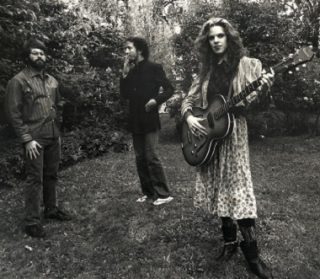
The Spyd’elles.
Steve Larsen, Jeff Simmons, Penta Leslee Swanson
After moving to Oregon Penta and Bill Larsen (still in Seattle) hooked up with Jeff Simmons to form The Spyd’elles. Jeff was a veteran of Seattle’s psychedelic era band Easy Chair. After playing The Seattle Pop Festival and opening for The Chambers Brothers, Cream, Blue Cheer and Led Zeppelin and hundreds of gigs throughout the Northwest Easy Chair were ‘discovered’ by Frank Zappa and his manager Herb Cohen during their sound check before they were slated to open for The Mothers of Invention at the Seattle Center Arena on August 24, 1968. They were impressed enough to fly Easy Chair to Los Angeles and a contract with one of two new labels Zappa had created, Bizarre Records. After a few high-profile showcases studio sessions never materialized and the band broke up. Simmons stayed in Los Angeles and ended up being signed to Bizarre Records as a solo artist and delivering two very fine albums. The first was an incredibly innovative soundtrack to Naked Angels a biker/sexploitation film. His second album ‘Lucille Has Messed My Mind Up’ included a host of Zappa regulars-and Frank Zappa himself. Soon Jeff was touring and recording with The Mothers of Invention from 1970 through 1974, with a brief hiatus during the filming of Zappa’s film 200 Motels
Penta says; “Jeff Simmons. I love that guy. He is such an incredible musician. He’s possibly the most incredible musician I’ve worked with besides Bill Rieflin. Jeff is just so amazing and I learned so much from him. He taught me a lot about singing. He taught me that I could do things with my voice that I didn’t know I could do. He encouraged me and pushed me and got me to sing songs that I never would have even thought that I could sing. Things like Etta James and Dusty Springfield .
“That’s pretty lofty praise”Jeff tells me
.“I’m good friends with Bill Larsen who was in ‘The Dynette Set’ says Jeff. “The thing is, I grew up in the ‘girl group’ era; pre-Beatles, so I have a special affinity for that music. Bill and Penta would come out to my place, they’d spend some time at Taco Time to get some tater-tots or whatever and then we’d rehearse the group. I actually have two songs recorded, and a live recording. Our repertoire was pretty eclectic. I had been in a band called the Del Psychics a little while before that and we had a singer who was my girlfriend at the time. That was one of my first chances to bring my sensibility of the girl groups into the Fender Rhodes, Clavinet, modern kind of deal.”
“We cut Nitty Gritty by Shirley Ellis and tackled some interesting tunes. Me, Bill and Penta would harmonize together on If You Think You Can You Can by Marcia Clark. “I also played piano with Penta” Jeff tells me. “Penta would also come around a little gig I had playing grand piano with bass player Billy McPherson. Billy had been in Ballin’Jack and The Regents out of Tacoma. He had been a child-prodigy that ended up in The Air Force Band. Then he played with Buddy Miles and Albert Collins He’s passed on now” Jeff says. “He and I and Bill Larsen and a various assortment of players would show up at The Pig and Whistle, a little joint on Greenwood Avenue in Seattle. Penta would sing. We did some continental-type jazzier stuff that was really esoteric and off the beaten path”.
“Penta is a tremendous singer and stage presence” Jeff continues. We only played a modicum of gigs as The Spyd’elles. Two or three live gigs because she was living in Oregon at the time and would come up and sing with us. All I can add is that Penta’s’ a fantastic talent, a beautiful woman and I really enjoyed my time with her and Bill. Like I said there’s a couple of recordings extant. Maybe I can dig them up someday”
I worked with Ben Ireland during the same time I was working with Jeff Simmons” Penta tells me. “I was doing a jazz thing with The Pete Leinonen Band . We’d played little lounge gigs. I got to choose my own material. Barb Ireland filmed us once, so there’s some footage of us somewhere in her collection. I sang, Ben was on drums and Pete was on bass. We also had horn players. It was low-key fun.
“After I moved from Bend to Eugene I started going to Massage therapy school. Penta tells me. “I wasn’t doing music at all, l just started back going to school. Then in I fell in love with my massage therapy program director. His name is Cliff Stenquist. We met in 2005. We’re still together”.
“I’m licensed to be a masage therapist. I also did a teacher training class with Sharon Gannon and David Life in 2008 at the Omega Institute in Rhinebeck New York. I’m also a certified yoga teacher. Sharon and David are the creators of the Jivamukti Yoga method. She’s created quite an empire” says Penta. It’s world renowned”.
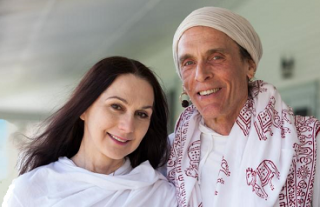
Sharon Gannon and David Life
Sharon has always been a caring, creative and spiritual person. It’s nice to see how far she’s come her days helping Student Nurse guitarist and graphic artist Helena Rogers pull her beautiful silk-screened posters of the 1980s. It’s also somewhat of a validation in her early association and dancing for Sue Ann Harkey and Audio Leter, a band so ahead of it’s time that it was once scorned even by Seattle’s alternative music community. It’s only recently that folks have looked back and seen how the avant-garde quality of what they were doing permeates much of what we hear today.
“I haven’t really written songs for awhile, but I’m still singing. We did a Dynette Set reunion shows in 2013 and 2015 at the High Dive in Seattle. That was pretty amazing to get everyone back together except Scott McCaughey. We also did a show at The Tractor Tavern which made reunions three years in a row. We also did a show at the EMP (Experience Music Project) in 2014. It’s now called MoPop (Museum Of Pop Culture). I just come up from Eugene and do shows in Seattle then go back. One time I’m going to come to Seattle and stay!”
“The 79’ers also got together in 2012. It was a whole mess of people. All the guys from The Dynette Set. Me and Riki Mifune. Rob Morgan. The guys from The Enemy. We had three different drummers; Dave Drewry, Marty Waychoff of The Girls and Peter Barnes of The Enemy. Rick Smith, also of The Girls was part of it. Henry Boy Jenkins was there. Too many people to name” Penta says. “It was supposed to be a one-off show, but a year later we did a show with The Dynette Set. It was basically the same line up for that show. I’m not sure if Rick Smith was there that year. The 79’ers opened for The Dynette Set 30th year reunion. at The High Dive. The 79’ers only did two shows and both were at High Dive.
Then Dave Drewry got really sick and died of cancer. It was horrible. I went down to L.A. at the very end of his life. It was so sad. He was such a good guy.”
Dave Drewry died on November 2, 2016. He was 57 years old.
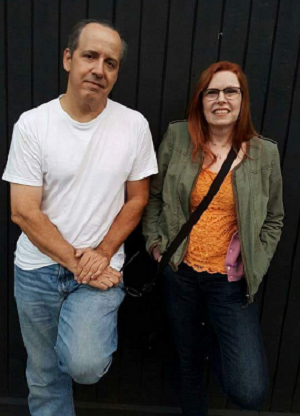
Dave Drewry and Penta
I absolutely adored Dave” Penta says. “He was a dear, dear friend. A fucking awesome drummer. He played that girl group music like nobody’s business. He could do that Hal Blaine thing like WOW! He was such a great drummer he was mind-blowing. A powerhouse. He held The Dynette Set rehearsals together. He was like a conductor during rehearsals. He kept everybody on track. Now it’s a little bit wonky in rehearsals. We’re all trying to be the boss, but we’re all over the place. Dave was really good at keeping everything together. He was funny as hell and he told great stories. He’d tell hilarious stories during rehearsals and keep us entertained”.
“We have a band now called The Mrs. Bill Larsens” Penta tells me.” She may not know I already know this, but Bill Larsen has already told me in a tongue-in-cheek manner that he objected to the name at first, but was out-voted.
“We do kind of girl group music, but not exactly” Penta tells me. “It’s kind of women’s music of the 1960s but not necessarily of the girl group genre. There’s a couple of girl group song in there. It’s really fun. Half of the members of the Dynette Set are involved Me and Shelly Stockstill will be singing together, which is interesting because we were never in the Dynette Set at the same time. She took my place when I left the band. So we’re having lots of fun with that. I’m going to be in Seattle because we have a show on the 9th of November at Slim’s Last Chance Saloon (5606 1st Ave, South in Georgetown) with Shagnasty and Shelley and I are also Shagnasty’s back-up singers The Shagri-las”. (like Shangrillas, geddit?)
The Mrs. Bill Larsens are Damon Titus, John Nay who used to drum for The Frazz and The Lewd, Brent Pennington, Shelly Stockstill, Penta and Damon Titus who’ve all been in The Dynette Set. Kevin Crosby is also in the band. He’s a Berklee School of Music graduate who’s really ino Frank Zappa. He had a Frank Zappa cover band called Zero that actually had Ike Willis in it, which was kind of cool. Ike Willis is a guitarist who was part of Frank Zappa’s studio and touring band from 1978 until Zappa’s final tour in 1988.
The Mrs. Bill Larsens tell me they absolutely LOVE Jackie DeShannon, so they’ll be doing some of her songs, including Each Time that Leslee Swanson sang on The Girls Can’t Help It compilation. For that matter they’ll probably do The Dynette Set song from the compilation. I’d even like to do more French pop music and add that kind of stuff to the repertoire we do with The Mrs. Bill Larsens”.
Bill tells me “We’re still trying to shake things out. Penta lives down in Oregon and it’s hard for us, because we don’t have any rehearsal space. We get space here and there when we can. So we pulled out some of the old Dynette Set songs that Shelley wanted to sing like ‘I Know A Place’ and ‘It’s Too Far’ and a handful of Jackie DeShannon songs…like ‘Put A Little Love In Your Heart’ and ‘What The World Needs Now’. All kinds of songs in that genre. Some of them are pretty tough songs to play. Everybody knows ‘Love Sweet Love’ but when you’ve just played three chord rock for a long time and then you come up to major 7, minor 9 chords it’s a chore. hat song; but it sounds great and Penta sings it great! We’ve only played two gigs so far. It seems that every stage we play on gets progressively smaller. We had to fit our band into the Lucky Liquor and then Tim’s Tavern. It’s even smaller. Our upcoming gig at Slims will have a bigger stage. That will be an interesting show because it’s going to be us, Shagnasty, Swedish Finnish and The Maywood Mailmen which is a John Prine cover band. I play banjo in The Maywood Mailmen. Bill says he didn’t understand the significance of the name of the Prine cover band until it was explained to him. There should be a few fans there that already know it.
“Shagnasty do a Mike Refuzor song” says Penta. “We love Mike. I’m so glad I got to hang out with him a little bit during the last year before he died. I saw him, and we danced together and he said ‘ I had such a good time’.
“We love Damon Titus too. He’s someone we’ve been trying to work together with for many many years. Finally it’s happening!”
AND WE LOVE THE BEATLES!!!
-Dennis R. White. Sources: Penta Leslee Swanson “Interviews with the author” (October 20, 2018 & October 25, 2018). Riki Mafune “Interview with the author” October 19, 2018). Bill Larsen “Interview with the author” (October 21, 2018). Jeff Simmons “Interview with the author” (October 30, 2018). James Trussart “Interview with the author” (October 30, 2018). Tessa Jeffers “Builder Profile: James Trussart Guitars” Premier Guitar, January 9, 2013). Bill Scheppler “The Mississippi Burning Trial: A Primary Source Account” (Rosen Publishing Group, 2003). “A Brief History of The Regents of Tacoma (pnwbands.com retrieved October 29, 2018). “Mader: About” (http://madermusic.com/mader, retrieved October 29, 2018). “The Living Theater” (https://www.livingtheatre.org/home, retrieved October 29, 2018). Olivier Lamm “Light and Shadow: The Story of Hector Zazou” (November 5, 2015, Red Bull Music Academy Daily). Garth Cartwright “Obituary: Hector Zazou” (The Guardian, September 23, 2008). “Alchemical Studios” (https://www.thealchemical.com, retrieved October 20, 2018). “Elliott Murphy: Biography” (http://www.elliottmurphy.com/bio.html, retrieved October 23, 2018). Derek Power “Mader: Biography” (IMDb.com. retrieved October 19, 2018). Pierre Job “Zazou/Bikaye/CY1: Noir et Blanc” (Pitchfork Magazine, November 8, 2017). Sid Smith “So Long Fred Chalenor” (DGM Live, July 4, 2018). Michael Sutton “Scott McCaughey Biography” (allmusic.com, retrieved October 30, 2018). Jeff Stevens “Seattle’s Flaming Telepaths” (City of Anxiety, January 9, 2017).





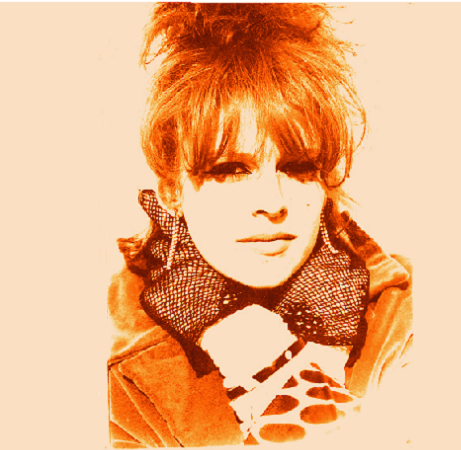
So Penta, Shelly, and I shared the same birth hospital in Wenatchee, which is also where both my parents worked in the lab (until my Dad went to med school). This means one of my parents likely drew and ran their mothers’ bloodwork. Small world. Too bad we were on different branches of the music scene back in the day.
4 articles in one, hard to follow but very enjoyable.
Great Story. Love you Sis!
Hello there Penta!! So pleased to read about you and know approximately where you are! Hope you are going with the flow and breathing more deeply than ever. Warmth and love from Eva in Paris ??
Hi Eva! I’m the author of the story about Penta. She’s a friend so I’ll pass your message on to her. Penta moved back to Seattle only a few months ago. If you want to contact her directly she’s on facebook using the name “Penta Swanson”